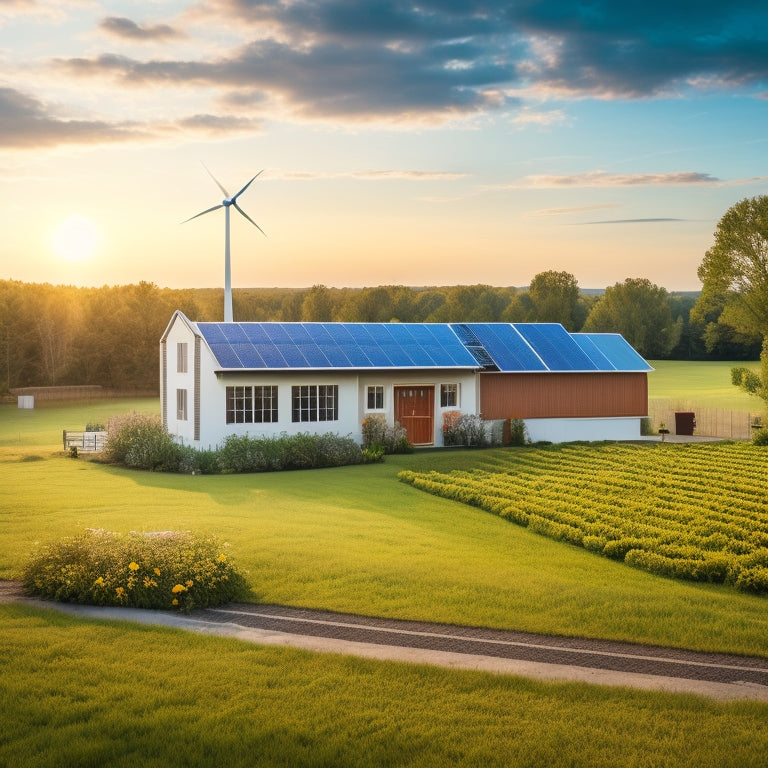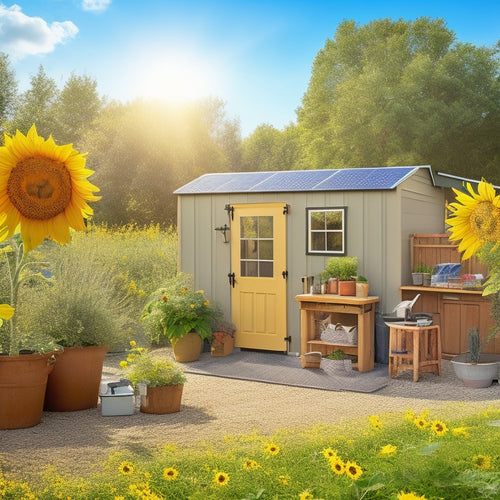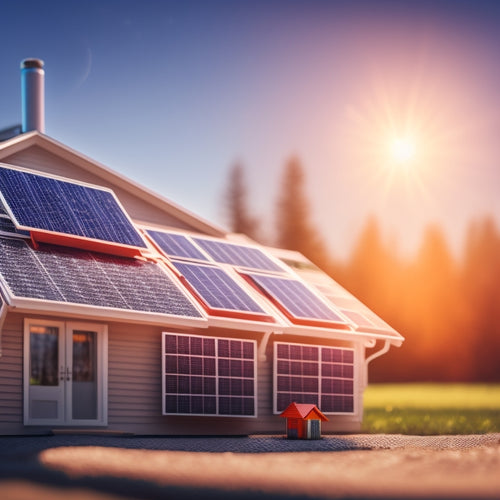
Off-Grid Solar Solutions for Energy Independence
Share
You're considering off-grid solar solutions to achieve energy independence, and you're taking the first step towards utilizing renewable energy and reducing your reliance on the traditional power grid. Off-grid solar systems, comprising solar panels, energy storage solutions, and charge controllers, allow you to disconnect from the grid and generate clean energy. Key factors like site assessment, energy consumption patterns, and system sizing influence the overall cost and efficiency of your system. Choosing the right solar panels, batteries, and inverters is critical, and evaluating high-efficiency solutions, government incentives, and maintenance requirements will help you optimize your energy independence - now, investigate the components and considerations that will take you closer to achieving it.
Overview
- Off-grid solar systems rely on renewable energy, comprising solar panels, energy storage solutions, and charge controllers for energy independence.
- Site assessment and evaluation of high-efficiency solar charging solutions are crucial for maximizing energy harvest and reducing environmental impact.
- Choosing the right solar panels involves considering factors like efficiency, durability, and wattage per square foot to ensure optimal performance.
- Inverters play a vital role in off-grid systems, with options including pure sine wave, modified sine wave, and square wave, each with unique features and benefits.
- Regular maintenance, including cleaning and monitoring, is essential to ensure optimal system performance and extend the lifespan of off-grid solar solutions.
Understanding Off-Grid Solar Systems
When venturing off the grid, you're fundamentally disconnecting from the traditional power grid, relying solely on renewable energy sources to power your home or facility.
An off-grid solar system consists of key components, including solar panels, energy storage solutions, and charge controllers.
Before installation, a thorough site assessment is vital to determine your energy consumption patterns and identify potential installation challenges. You'll also need to maneuver solar regulations in your area.
To guarantee a reliable off-grid power system, it's important to evaluate high-efficiency solar charging solutions that maximize energy harvest and advanced features that enhance performance.
The environmental impact of off-grid solar is notably positive, and financial incentives may be available to offset the initial investment.
Home Solar Panel Costs Breakdown
As you design an off-grid solar system that meets your energy needs, you'll need to reflect on the costs involved. A thorough site assessment is vital to determine the size of your system, which directly affects the overall cost.
The Balance of System (BOS) Components account for 30% to 40% of total system expenditure, making it important to choose the right components for peak efficiency. Installation savings can be achieved through DIY installations, but it's important to take into account local regulations and permits required.
Financing options, such as government incentives, can help alleviate the upfront cost. An energy audit will help you identify areas of inefficiency, allowing you to maximize your system's performance.
Long-term benefits include reduced energy bills and a lower environmental impact. Maintenance plans should also be factored into your budget to guarantee your system runs efficiently.
Choosing the Right Solar Panels
When selecting solar panels for your off-grid system, you'll want to take into account three key factors: the panel's efficiency, its durability, and its wattage per square foot.
Efficiency determines how much power the panel can generate from sunlight, while durability affects its lifespan and reliability.
High-efficiency solar panels from brands like SunPower and Panasonic are recommended for peak performance, as quality solar panels greatly influence system performance and longevity.
Solar Panel Efficiency
You're about to invest in a solar panel system, and you want to guarantee you're getting the most out of it.
Solar panel efficiency is vital in maximizing your energy independence. Look for solar panels with high conversion rates, typically above 20%. This guarantees that a larger portion of sunlight is converted into usable energy.
Recent solar panel innovations have led to significant improvements in efficiency, making it possible to generate more power per hour of sunlight.
Additionally, consider the solar panel lifespan, as high-efficiency panels often last longer. A longer-lasting system means fewer replacements and more years of enjoying the freedom that comes with off-grid energy independence.
Panel Durability Matters
Frequently, a solar panel system's durability is overlooked in favor of efficiency, but it's equally essential in guaranteeing your off-grid energy independence.
You want panels that can withstand harsh environmental conditions, such as extreme temperatures, humidity, and weathering. Look for panels with high material longevity, minimal performance degradation, and extensive warranty coverage.
Real-world testing and product certifications, like UL and IEC, confirm the panels meet strict standards. Installation conditions, maintenance schedules, and temperature resilience also impact panel durability.
Wattage per Square Foot
Solar panel selection hinges on a vital metric: wattage per square foot, which directly impacts your off-grid system's energy output and overall efficiency.
As you choose the right solar panels, you'll need to calculate the wattage per square foot to guarantee peak performance. A higher wattage per square foot means more energy output from a smaller surface area.
For off-grid systems, this is essential, as space is often limited. When making your wattage calculation, consider factors like panel efficiency, temperature coefficients, and irradiance levels.
Solar Battery Options and Pricing
Several key factors contribute to the overall performance and cost of an off-grid solar system, and the choice of solar battery is chief among them.
You'll need to assess battery types, such as lead-acid, lithium-ion, or saltwater batteries, each with its own pricing trends. Capacity evaluations are critical, as you'll want a battery that can store enough energy to power your system during periods of low sunlight.
Installation costs, performance metrics, and warranty options also vary by brand, so it's crucial to compare options from top manufacturers like Tesla, Sonnen, and SimpliPhi.
Additionally, evaluate maintenance needs, as some batteries require more upkeep than others.
Inverters for Off-Grid Systems
When designing an off-grid solar system, you'll need to select an inverter that meets your specific needs.
You'll have to choose from various inverter types, including pure sine wave, modified sine wave, and square wave inverters, each with its own advantages and limitations.
As you evaluate your options, you'll also want to contemplate grid tie functionality and power conversion efficiency, which can greatly impact your system's overall performance.
Inverter Types Compared
Three primary inverter types dominate the off-grid solar market: string inverters, microinverters, and power optimizers. You'll need to choose the right one for your system.
String inverters are the most common, offering a cost-effective solution, but they can be less efficient. Microinverters, on the other hand, provide maximum flexibility and monitoring capabilities, but at a higher cost.
Power optimizers offer a balance between the two, providing panel-level monitoring and optimization. When selecting an inverter, consider the waveform type: pure sine for sensitive electronics and modified sine for less demanding loads.
Proper inverter sizing is essential to guarantee efficient energy production. Look for inverter features like surge capacity, ground fault protection, and battery charging capabilities.
Leading inverter brands include Schneider, OutBack, and Magnum Energy. Research each type to determine the best fit for your off-grid solar system, assuring a long inverter lifespan and reliable energy independence.
Grid Tie Options
As you've contemplated the inverter types for your off-grid solar system, you may be wondering about the role of grid tie inverters in off-grid systems.
While they're typically associated with grid-connected systems, grid tie inverters can also be used in off-grid configurations. The grid tie benefits include selling excess energy back to the grid and using the grid as a backup during periods of low solar production.
However, grid tie drawbacks include the need for a connection to the grid and potential grid tie regulations.
Grid tie installation requires specific configurations to guarantee safe and efficient operation.
You'll need to evaluate grid tie performance, financing options, and incentives when deciding if a grid tie inverter is right for your off-grid system.
Power Conversion Efficiency
Most off-grid solar systems rely on inverters to convert DC power from solar panels into AC power for household use.
As you design your off-grid system, it's vital to take into account power conversion efficiency to minimize power loss and optimize energy storage. Look for inverters with high conversion technology and efficiency standards to guarantee maximum energy yield.
Solar tracking and system optimization features can also help reduce power loss and improve overall performance. Additionally, load management capabilities can help you prioritize energy distribution and provide a stable supply.
Installation and Maintenance Tips
Proper installation and maintenance are essential to guaranteeing your off-grid solar solution operates efficiently and reliably. You'll want to evaluate factors like site selection, system sizing, and cable management to guarantee peak performance. A well-designed system will also require less maintenance down the line.
| Tip | Description | Importance |
|---|---|---|
| Conduct regular cleaning | Remove dirt and debris from panels to maintain efficiency | High |
| Monitor system performance | Track energy production and consumption to identify issues | Medium |
| Perform routine inspections | Check for signs of wear and tear on cables and connectors | High |
| Store spare parts | Keep replacement components on hand to minimize downtime | Low |
Frequently Asked Questions
Can I Use Off-Grid Solar Systems for Commercial Properties?
You can definitely use off-grid solar systems for commercial properties, enjoying commercial solar benefits like reduced energy costs and increased independence. However, you'll need to contemplate system design considerations, such as load calculation and battery sizing, to guarantee a reliable and efficient system.
How Do I Ensure System Performance During Prolonged Periods of Low Sunlight?
To guarantee system performance during prolonged periods of low sunlight, you'll want to invest in reliable battery storage and prioritize regular system maintenance, checking for ideal panel angles, clean surfaces, and efficient energy distribution.
Are Off-Grid Solar Systems Compatible With Existing Electrical Infrastructure?
You'll find that most off-grid systems are designed for seamless system integration, ensuring electrical compatibility with your existing infrastructure, allowing you to effortlessly shift to renewable energy while maintaining the reliability you need for true independence.
What Happens to Excess Energy Generated by My Off-Grid Solar System?
As you bask in the abundance of your off-grid solar system, excess energy is utilized through energy storage solutions, like batteries, which are carefully selected during system sizing to guarantee you're never left in the dark, and always in control of your power.
Do I Need a Backup Generator for My Off-Grid Solar System?
You'll need a backup generator if you can't rely on your battery storage to cover energy shortfalls, but with advanced energy management, you can optimize your system to minimize generator usage and maximize your freedom from the grid.
Ready to Buy
As you commence your off-grid solar adventure, remember that energy independence is within reach. With the right system design, component selection, and installation, you'll be harvesting sunshine like a farmer tends to their crops. By understanding the complexities of off-grid solar, you'll be well-equipped to steer through the process, making informed decisions every step of the way. Like a conductor leading an orchestra, you'll harmoniously bring together solar panels, batteries, and inverters to create a melody of sustainable energy.
Related Posts
-

Building an Emergency Backup Solar Power System in 5 Essential Steps
Building an emergency backup solar power system involves five key steps. First, assess your daily energy needs to ide...
-

A Beginner's Guide to Navigating the Solar Investment Tax Credit
You're eligible to claim a significant Solar Investment Tax Credit (ITC) of 30% of total installation costs, but mane...
-

Top Solar Powered Camping Fans for Camping Enthusiasts
If you're a camping enthusiast, a solar-powered fan can be a transformative element for your outdoor experience. Thes...


